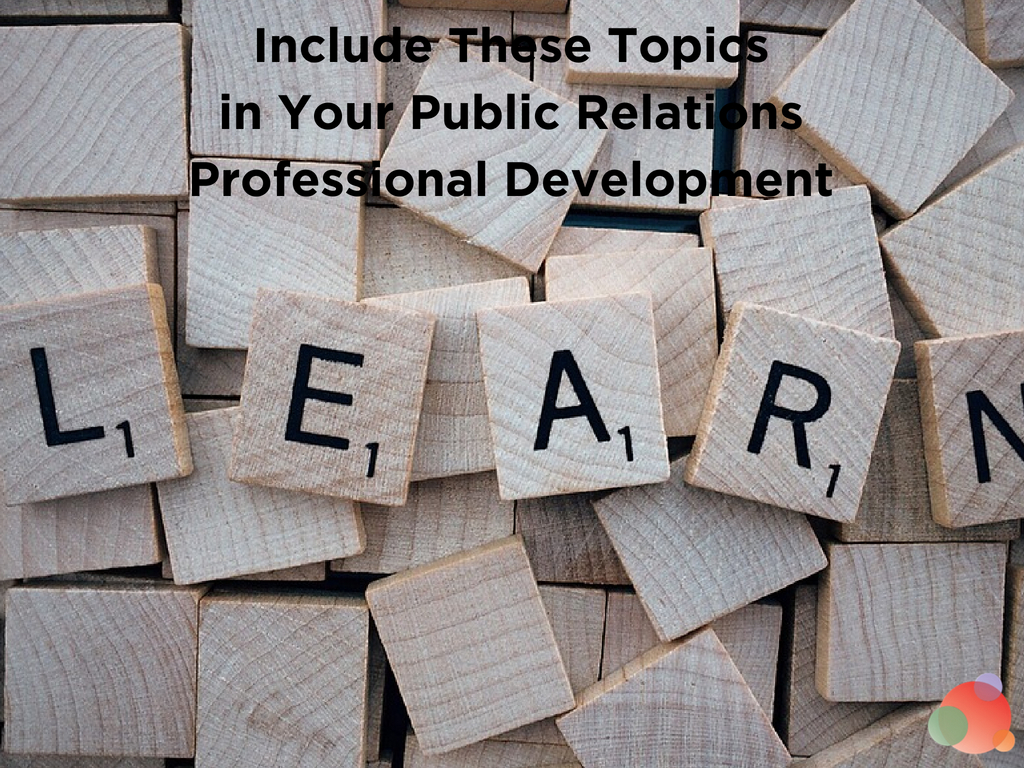
Public relations professional development is a never-ending black hole of learning.
Which, if you are like the team here at Spin Sucks, that’s part of what makes it such an awesome field to be in.
So far this summer I’ve written about why (and how) to include productive reading and writing into your public relations professional development mix (Gini Dietrich also wrote about the importance of reading fiction). I also reviewed some online courses you might want to look into.
Today I’m going to dig into a topic I mention in both of those: non-communications related subjects you should study.
A Communicator’s Knowledge Must be Broad and Deep
Our industry changes constantly.
We have multiple industries and professional niches we need to stay on top of at all times.
Even if we only specialize in one small piece we need to understand how our part fits into the ever-changing big picture.
We also need to understand the ins and outs of the organizations we work for or with.
And finally, the most challenging of all, we need to understand people.
How they think, what motivates them, and what drives behavior.
People are tough.
So while it’s easy to fill your allotted public relations professional development hours only focused on building skills and learning new things in our communications microcosm, you’d be better served to diversify your learning.
Here are five non-communications related topics every communications pro should study (and why).
Psychology and Neuroscience Help Us Understand People
Big shock here. I feel like 90 percent of my job depends on these two topics.
Think about all the things we do that require an understanding of how people think and behave?
- Client service
- Relationship development
- Lead generation and conversion
- Message development
- Branding
- User experience
- Development of effective calls to action
- Content development
- Media relations
- Influencer relations
- User generated content….
You know what, I’m going to stop there. EVERYTHING WE DO requires an understanding of how people think and act.
We often study these things as part of our industry-focused public relations professional development. However, there is also tremendous value in learning about them separate from only the context of what we do.
Recommended resources:
- Psychology Today
- Hidden Brain Podcast
- Brain Science Podcast
- Neuroskeptic
- Brain Blogger
- Roger Dooley’s blog and podcast
- Your Brain Health
- Invisibilia
Sociology and Social Sciences Help Us Understand Groups
Not only do you need to include how people think in your public relations professional development, you need to understand how groups think.
What motivates collective action (or inaction) and how the environment drives and changes action.
You need to understand sociology.
Recommended resources:
Got Physiology? Improve Your Understanding of Systems
OK, OK…I know all you science haters are cringing right now.
In my opinion, there is NO better way to get a solid understanding of how systems work together than physiology. It shows the intricate relationship between every social, emotional, psychological, spiritual, and physical stimuli.
Social sciences like sociology and psychology offer a similar type of learning as what we are used to in communications. Physiology (and the next topic on our list) force your brain to work in a different way. This increases neural pathways and improves everything you do. (It works in the same way as doing things you are bad at.)
Recommended Resources:
Especially for the non-science lover, Andy Galpin provides fantastic consumable bites of info about physiology and human performance.
You might even find this knowledge improves your health and understanding about your body. Even better!
Put Data Into Action with Chemistry or Economics
You guys hate me, right? Have I lost you?
Hear me out.
Both chemistry and economics are fantastic fields of study because they train you to use data to extrapolate conclusions.
You need to be able to do this as a communications professional.
It’s one thing to monitor and track PR metrics. It’s an entirely different issue to be able to look at the data and use it in a meaningful way.
Data for data sake is useless. Data-driven decision making is golden.
Recommend Resources:
This one is a bit tougher, Coursera has an abundance of chemistry and economics courses to choose from. While you’ll sadly not get the valuable lab part of chemistry, it will still be valuable.
You can also add in some at-home chemistry experiments. These probably won’t be valuable as part of your public relations professional development but are suuuuuuuuuuuper fun! (You better believe I’m forcing my Rob to do some of these this weekend.)
Public Relations Professional Development Stretches You
The more you know, the better.
The brain benefits alone are worth stretching out of your comfort zone a bit.
Add on the ability to better understand how people, groups, and systems work.
Top it off with the ability to better apply data to make smart strategic decisions — diversifying your learning just makes sense.
Public relations professional development diversification in this way just makes sense.
What Would You Add?
Now it’s your turn. I threw physiology and chemistry at you, what unexpected topics or resources would you add to this list?
Do you come from a non-communications background?
How have you found that diversified education helps or hinders your work as a communications pro?
Most importantly, who is going to be doing at-home chemistry experiments this weekend? (Important legal note: Spin Sucks is not responsible for anything you burn, discolor, or blow up.)